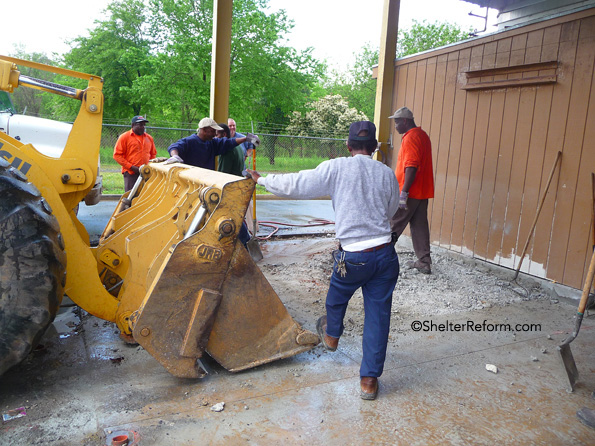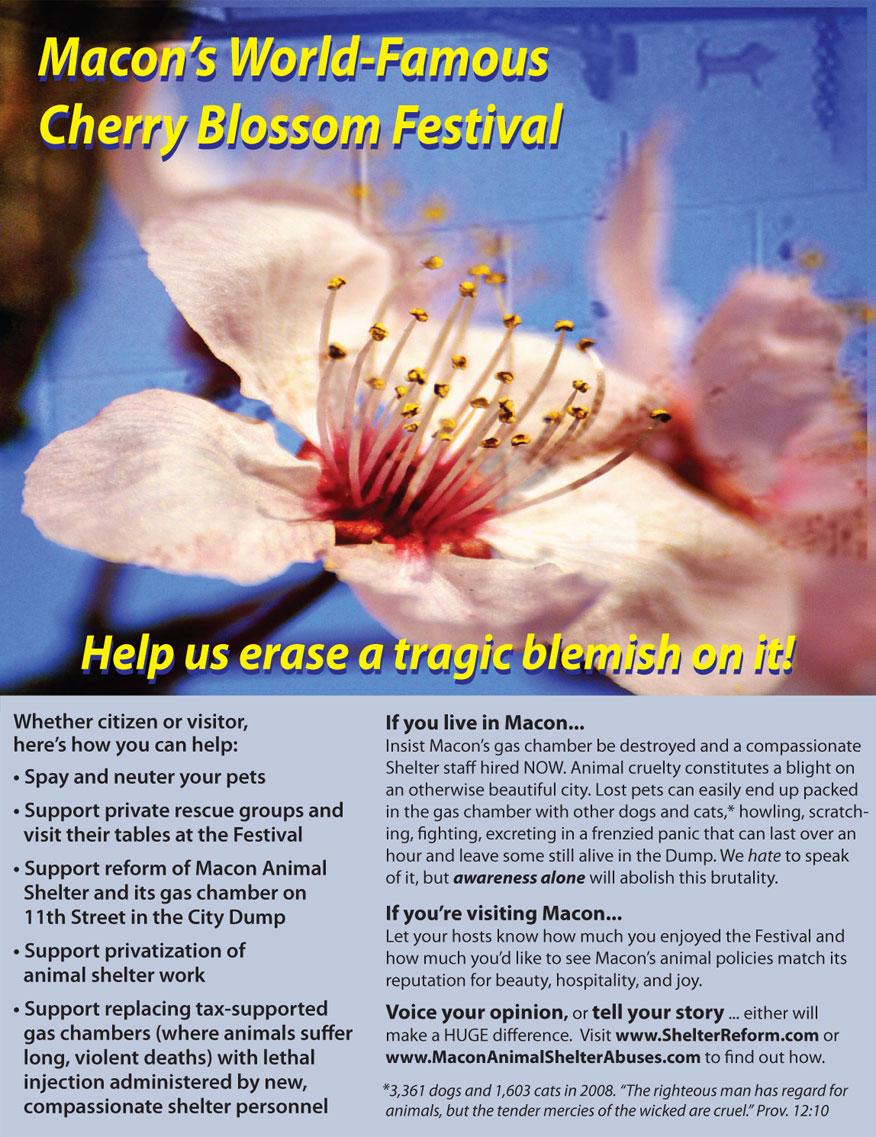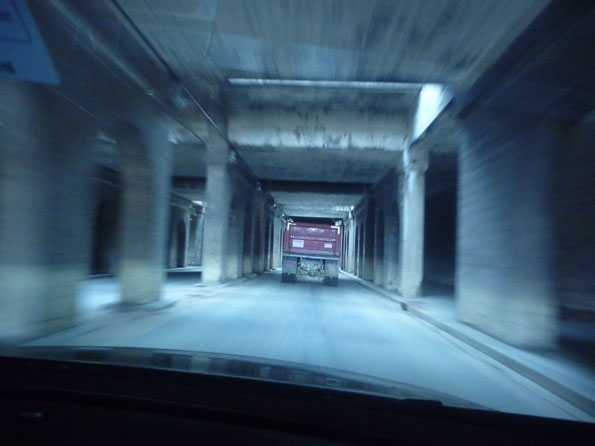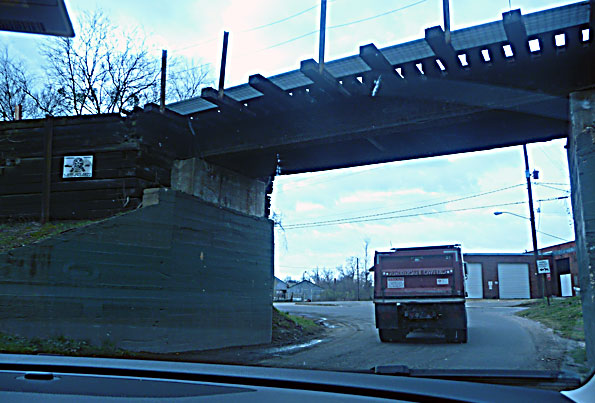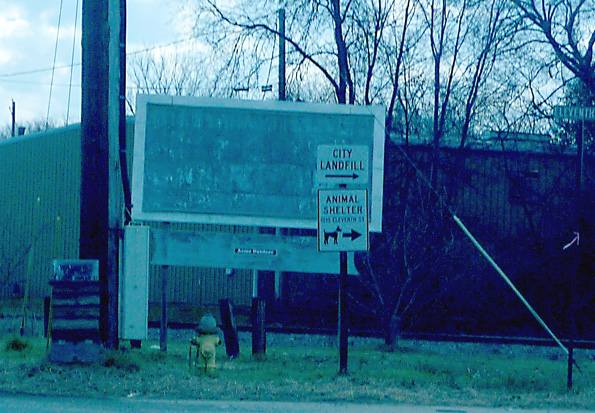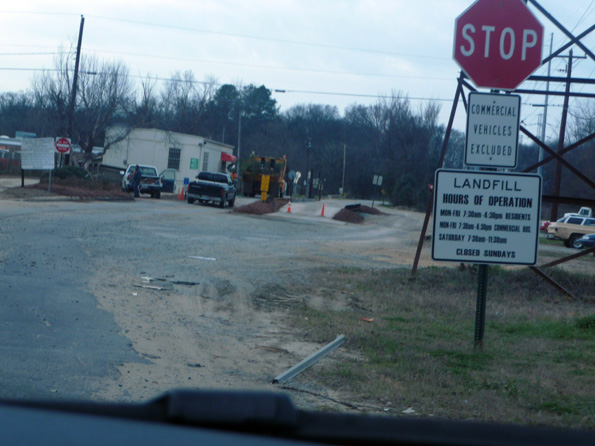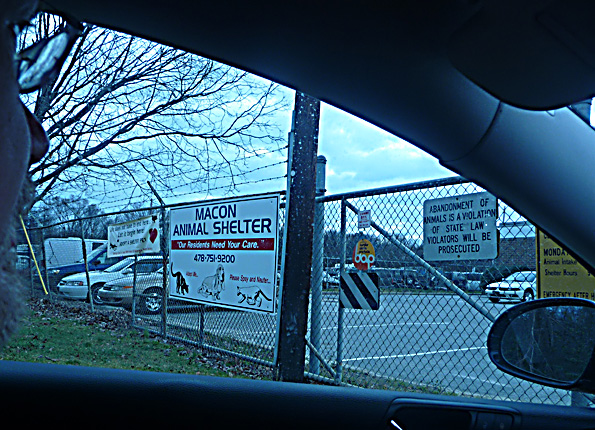
This page offers independent information about how animals are treated at the Macon Animal Shelter. If you are looking to surrender, reclaim, adopt or rescue an animal at the Macon shelter, you will find the information on this page helpful but you must visit the official Macon Animal Shelter website.
Macon Animal Control Officer wins 2010 Maggie Award!
Historical Background
YOU can help: Why writing is so important
YOU can help: Talking points
YOU can help: Sample text - for a Macon citizen
YOU can help: Sample text - for a tourist visiting Macon
YOU can help: Email addresses for Macon's City Council & Mayor
YOU can help: Address for sending letters
Breaking News: National Animal Shelter Reform Week (Nov. 7-13, 2010): A Prime Opportunity for Macon
Breaking News: Police Internal Affairs Investigation of Animal Shelter drawing to a close
Breaking News: Macon City Council Members propose new animal shelter!
Breaking News: Volunteer helps give Macon animal shelter a perception makeover
Breaking News: Macon gas chamber demolished
Breaking News: Shelter Reform attends gas chamber ceremony
Breaking News: Macon's gas chamber to be demolished on April 13, 2009!
Breaking News: Your emails shook Macon's City Council into action!
Breaking News: Director: Macon Animal Shelter under Internal Investigation
Breaking News: Economy 'pounds' pets
Macon's Gas Chamber (demolished April 14, 2009)
Flyer for Macon's 2009 Cherry Blossom Festival
Road Trip to Macon Animal Shelter
Evaluating Macon's Problem
Pondering Macon's Solution
Why Lethal Injection Is Not Enough in Macon
Animal Advocates in Macon
Historical BackgroundIn February of 2009, after Kathy's inadvertent discovery of things that would have been much easier for her to turn her back on than think more about, she drafted a letter to state, county and local officials calling for their immediate attention. In addition, she circulated her story at Macon's 2009 Cherry Blossom Festival on the backside of a color flyer she and her husband created, along with this website, to try to help end the suffering.
As a result, animal lovers from Macon and all over the country voiced their concerns to Macon city officials and on April 13, 2009 we rejoiced with the animals and those who care about them when Macon demolished their gas chamber. That was a long awaited first step toward improvement.
Kathy's original letter (we will provide a copy on this website shortly) prompted the Macon Police Department to open an Internal Affairs Investigation into her allegations against the Macon Animal Shelter in March 2009. During the ensuing months, all of the concerns and allegations that Kathy made in her letter were confirmed by eye witness testimony and a police line-up. It has frustrated us that the consecutive officers in charge of the investigation have continued to resign or transfer without warning. The investigation was finally steaming toward completion due to the strong commitment to thoroughness evidenced by the then-presiding Captain who was creditworthy. Shelter Reform expects his replacement, who contacted us on March 15, 2010, to carry the Investigation to completion in the spirit of his predecessor. It is our desire to see the investigation finished and closed in an honest, upright, and responsible manner that will secure justice for all perpetrators of animal neglect and cruelty and bring long overdue relief and safety to Macon's innocent animals.
Macon is not being singled out, because its civic leaders are far from being alone in what they allowed to happen in their city’s animal shelter. They finally followed the examples of civic leaders like Augusta’s Mayor Larry Sconyers. Gassing had just become a hot issue in Georgia when the cruelty of the process was brought to Mr. Sconyer’s attention. He wasted no time on politics and received well-deserved praises for immediately and decisively ordering an end to the gassing of his city’s animals. Considering that Mayor Sconyers took this progressive action back in 1998, any city that to this day, on top of maintaining a high kill facility (a shameful blemish on any city), uses an inhumane gas chamber to do their dirty work has no excuse for being so far behind.
Why did Macon continue using their gas chamber for so long before destroying it? Macon City Councilmember Erick Erickson offered his own observations back in 2008. His comments are an excellent reminder about why animals and politics do not mix.
Macon City Councilman Rabbi Larry Schlesinger pointed out as he (along with Councilwoman Nancy White) courageously led his city toward its current much-needed reform efforts: "A society is judged by the way it treats the most vulnerable inhabitants."
Recent improvements at the Macon facility since the gas chamber demolition have put them on the right path. We hope the community continues to improve at the reported rate they're going, as we'd be delighted to include their shelter on our list of good shelters!
How YOU can help
Why writing is so important
The job is NOT done because the gas chamber is gone!
There is extraordinary evidence that further reform is needed in Macon. If several hundred people leave this page without sending even one email, the only victims of inaction will be the animals.
The pen is mightier than the sword. Change happens when individuals make clear to public officials what they expect, and refuse to tolerate anything less. In 2009, public emails from all over the country prompted Macon to demolish their gas chamber ahead of schedule. The gas chamber demolition was the result of many people's hard labors over time, including caring citizens and rescue groups in Macon. It was demolished early because so many people spoke out.
Talking points
(1) Thank Macon City Officials for progress to date
City officials got rid of the gas chamber on April 13, 2009, and did NOT wait until July to put bulldoze it into oblivion! We can justly praise Macon city officials for taking this important first step.(2) Bring up the importance of the Internal Affairs investigation
The next critical step is to ensure humane treatment for Macon’s animals. Compassionate, responsible, trustworthy staff are absolutely essential not only to humanely administer any form of euthanasia, but to humanely care for animals at every step of the way, from the time of their capture by animal control officers to their final moments at the animal shelter.The Internal Affairs Investigation into Macon Animal Control had hit a few bumps and had to be restarted after the first investigator retired without having completed a critical police lineup. The second officer reopened the investigation and established a better interview policy (not restricting a group of key witnesses to only 15 minutes each as before and seeking several other key witnesses who hadn't testified under the first investigator's watch). As of the second week of March, 2010, a third investigator has taken charge of the investigation and is attempting to get a second police lineup scheduled (with a different witness) and is looking to wrap up final loose ends. Tell Macon city officials that you expect to see this investigation handled properly, fairly, and thoroughly -- and then moved into the hands of the Police Chief for appropriate action.
(3) Press for privatization of animal sheltering services in Macon
Politics and animals don't mix. Macon appears to be moving toward greater community participation in its shelter, which is commendable as far as it goes. But much more can be achieved for the animals' sake. Considering the current administration's past neglect of these things, outsourcing the hold and adoption functions entirely is the animals' best bet. Leaving the collection of animals in the hands of the police authority is appropriate with respect to governmental power to seize property, including an animal owned by a citizen. But proper care and housing of animals is outside of any police department's main concerns, and the animals too often get the short end of the deal when it comes to care and budgets. Some councilmembers have discussed the possibility of putting the hold and adoption functions out for bid. It's time for them to get serious and actually do so, thereby completing the transformation of Macon Animal Shelter in a way that's best for the animals and most efficient for the government of Macon. Outsourcing is an idea whose time has come. Make Macon's Mayor and city council members know it. Let Animal Control do what they do best (collecting the animals - with limited use of control poles) and let the most qualified winning bidder do what they do best (caring for the animals and finding "forever homes" for them all).
Sample text - for a Macon citizen
Dear Council Member,
I'm writing to praise your decision to destroy the inhumane gas chamber at your animal shelter on April 13, 2009 rather than waiting until July to do so. Thank you for this first major milestone toward humane treatment of animals in our city. It is something we can all be proud of.
Now that true reform has started in a big way, please remember the importance of following through. I would first urge you to make sure our animal shelter starts keeping hours that allow working folks to stop by, and families to visit on weekends. The many lives of homeless pets that would be saved through increased adoptions would far outweigh the small expense required for the minimal staff required to greet the public.
I'd also like to see shelter animals brought out into the community (to parks, events, etc.) so we and our families can interact with them without making a special trip to the shelter; such off-site adoption events are very successful in other progressive cities.
Next, and probably most importantly, I urge you to make sure that MPD does justice with the Internal Affairs Investigation into prior shelter conduct. Our shelter's new lethal injection program is just one area where compassionate people are absolutely essential to ensure our animals are treated well. After reading the stories posted on www.shelterreform.com, I am not confident that the current shelter staff fits the bill. That staff still includes the individuals who would have done the horrible things alleged in Kathy Selbrede’s flyer (also posted on www.shelterreform.com).
FInally, it would make sense to think about outsourcing the hold and adoption functions at the animal shelter to maximize humane treatment and move Macon toward becoming a true No-Kill city.
The destruction of the gas chamber was worth celebrating. Let's be sure we finish what we started last year for the animals who are among our community's most vulnerable members.
Thank you for your leadership on this issue,
<your name here>
Sample text - for a tourist visiting Macon
Dear Council member,
Thank you for your decision to destroy the inhumane gas chamber at your animal shelter on April 13, 2009 instead of waiting until July! I'm writing to praise your decision. This was a major move in the right direction – it elevated Macon and makes me proud to visit there again.
In the wake of such a positive move for your community, I urge you to follow through on your great start by first keeping the shelter open either earlier or later so that working folks can stop by, and on weekends so that families can visit. I'd also recommend taking shelter animals out into the community (parks, events, etc.) so people can interact with them; off-site adoption events are very successful in other progressive cities. Next, I would expect that Macon will see that justice is done with the Internal Affairs Investigation into prior shelter conduct. FInally, it would make sense to outsource the hold and adoption functions at the animal shelter to maximize humane treatment and move toward becoming a true No-Kill city.I urge you to continue to bring your animal control policies and personnel in line with your well-earned reputation as a hospitable tourist attraction in the heart of Georgia. The destruction of the gas chamber is worth celebrating. It was an important milestone that you can proudly build upon as you bring your beautiful city all the way into the 21st century.
Thank you for your leadership on this issue.
<your name here>
Email addresses for Macon City Council & Mayor
Ward I
Lonnie Miley lonnie.miley@macon.ga.us
Rick Hutto rick.hutto@macon.ga.us
Elaine Lucas elaine.lucas@macon.ga.usWard II
James E. Timley, President Pro Tem james.timley@macon.ga.us
J. Michael Cranford mike.cranford@macon.ga.us
Ed Defore ed.defore@macon.ga.usWard III
Larry Schlesinger larry.schlesinger@macon.ga.us
Alveno Ross alveno.ross@macon.ga.us
Tom Ellington tom.ellington@macon.ga.usWard IV
City Council President Miriam Paris miriam.paris@macon.ga.us
or by phone at 478-751-7260
Charles Jones charles.jones@macon.ga.us
Virgil Watkins, Jr. virgil.watkins@macon.ga.usWard V
Lauren Benedict lauren.benedict@macon.ga.us
Nancy White nancy.white@macon.ga.us
Erick Erickson erick.erickson@macon.ga.usMayor Reichert at the Macon City Website
or call his office at 478-751-7170
Address for sending written letters
Macon City Council
P.O. Box 247
Macon, Georgia 31202
National Animal Shelter Reform Week November 7-13, 2010
A Prime Opportunity for MaconNovember 4, 2010: There's no better time than National Animal Shelter Reform Week for the City of Macon to decisively implement the changes needed to shift out of its current high-kill business model. Shelter Reform is urging the decisionmakers in Macon to not let this auspicious opportunity pass the city by. The time is now.
Macon Police Internal Affairs investigation of animal shelter drawing to a close soon
March 15, 2010: Shelter Reform had maintained a voluntarily-imposed "gag rule" since the Spring 2009 launch of the Internal Affairs Investigation into a litany of allegations of animal cruelty, abuse, and neglect at the Macon Animal Control facility. Shelter Reform personnel had abided by this self-imposed rule through the tenures of the first two investigators/administrators presiding over the Investigation. Now that the second individual has transferred to another division (after insuring that a police lineup erroneously omitted during the first investigator's tenure was properly scheduled and conducted and attempting to tie up other loose ends), a third officer is now in charge of bringing this long process to a close.
Kathy Selbrede's letter to Lt. Governor Cagle reportedly triggered the investigation a year ago. The bulk of the witness interviews were conducted at the law offices of Shelter Reform's counsel to provide a safe haven for the witnesses coming forward, while the first police lineup was held downtown at the police department (a second witness's lineup is still pending). Once the final report is completed, it will be sent to the Chief of Police for review. The Chief will then decide how to act upon the results of the Report, after which the Report's contents will become available for public review under the Freedom of Information Act. Shelter Reform has acquired hundreds of pages of Shelter documents through Open Records Requests to better scrutinize the situation that recently prevailed at the Shelter (although there are indications that the reported improvements are more than mere propaganda, they actually have substance).
Shelter Reform desires to see justice done with respect to any officers guilty of abuse, cruelty, or neglect. If such individuals are identified, they should be barred from further interaction with animals. Their continued presence at the Shelter is inconsistent with the recent marked improvements that have been reported.
While Shelter Reform has recordings of all the witness testimony, those are being held in trust while the proper law enforcement mechanisms are brought to bear upon the situation at the Shelter.
Macon City Council Members propose new animal shelter
February 2, 2010
Macon council committee tables thorny issues
Chris Horne, chorne@macon.com
Macon City Council's Appropriations Committee tabled its most controversial agenda items Monday.
An effort to outsource the city's medical dispensary, where city employees receive medical treatment, drew the most discussion. The dispensary has been without staff after one employee retired and another was laid off last month. Human Resources Director Ben Hubbard said city workers are using Caduceus Occupational Medicine until a contract is approved by the council.
Concerned about the lack of minority-owned companies doing business with the city, Councilwoman Elaine Lucas requested documents from the bid process for the dispensary. The company that lost the bid is a minority-owned business, and Lucas questioned whether the bid process gave the winning company an advantage. City officials said both companies were able to see what the other bid, and each was directed to make its lowest offer, according to the proposalís specifications.
Councilwoman Lauren Benedict, who specializes in workers' compensation issues, had problems with the ordinance dealing with the contract, too. As written, she said, the ordinance would direct city workers to the dispensary first when state law requires them to have a choice from a panel of doctors.
After 45 minutes of discussion, the committee tabled the issue and asked for an update in two weeks.
In another matter, Councilman Mike Cranford pulled back an ordinance that would have moved the director of Channel 14, which airs City Council meetings, city news conferences and city job announcements,from the IT Department to the mayor's office.
As the sponsor of the ordinance, he explained that Mayor Robert Reichert and Chief Administrative Officer Thomas Thomas asked for time to speak with the affected employee, Ron Wildman.
The committee also discussed formally including the Fort Hawkins master plan as part of special purpose local option sales tax discussions with Bibb County. That opened the door for other council members who proposed adding a community center at Fillmore Thomas Lake, improving Luther Williams Field, building a new animal shelter and creating a cultural arts umbrella that would fund various projects.
Councilman Ed DeFore, who sponsored the attempt to have Fort Hawkins added to the sales tax negotiations, quipped, "You better get the courthouse to cut one of their floors off if we want to get all these we want done."
The only resolutions the committee approved were for purchases of vehicles and equipment. However, a resolution to purchase a flatbed truck was tabled because the original bid winner could no longer provide the truck.
Return to top of page
Volunteer helps give Macon animal shelter a perception makeover
January 30, 2010
Chris Horne, chorne@macon.com
Patti Jones has been volunteering less than a year at Macon's animal shelter, but she's already made a big impression.
Jones was named Volunteer of the Year by the Macon Police Department and was recognized at a City Council meeting this week.
"I don't think the woman sleeps," Animal Control Director Jim Johnson said, praising her contributions and energy.
She acknowledged the honor would have been much harder to come by if it hadn't been for AC Pup, the animal shelter's mascot who was rescued on the brink of death as a 4-week-old puppy. Thanks to Jones, AC is among the biggest celebrities in the midstate. His Facebook profile already boasts a whopping 2,201 friends, a figure that likely will grow this weekend.
Today from 10 a.m. to 2 p.m., Jones and her organization, Central Georgia CARES, are throwing AC a birthday party at the city shelter, 1010 Eleventh St. She said itís a chance for the public to meet AC, view the facility and find a new pet to take home.
And that's just the start of her efforts.
Bringing a business-minded perspective, Jones formed CARES with the sole focus of eliminating the gas chamber used by the shelter to euthanize animals by July 1, 2009. The group accomplished that early last April and also helped build a new euthanasia room to create a more peaceful atmosphere for lethal injections.
After reaching that goal, members immediately set new ones: increase adoptions and decrease euthanizations.
Johnson said some progress already has been made. From 2008 to 2009, adoptions increased from 156 to 226 and euthanizations decreased from 4,979 to 4,639.
Jones said sheíll continue fighting on behalf of the animals who can't."If we get backing from the community, there ís really no telling what we can do," Jones said.
Her next big project is the Snippers Committee, an educational push for more spaying and neutering.
Johnson said other volunteers have focused on negative aspects of the animal control operation, such as the condition of the building and its proximity to the city landfill. Jones is the first, he said, to focus on the positive and encourage others to do the same.
"It's changed the perception of the shelter to the public," Johnson said.
Councilwoman Nancy White has known Jones almost 20 years. When the council got involved with effort to eliminate the gas chamber last year, she said she immediately thought of Jones.
"She's very imaginative and creative," White said, noting the public service announcements, the bulletin boards and events that Jones has put together.
"We have very small resources to work with, of course, and she's like dividing five loaves and two fishes," White said.
"People aren't going to believe some of the things she comes up with next."
Jones stresses that this movement isn't just about pets.
"There's such a link between compassion for animals and compassion for people," she said. "We want to raise a generation of compassionate people."
Return to top of page
Macon gas chamber demolished
April 14, 2009: While meat tenderizers got a corner on the action the previous day, it was heartening to see the real demolition work on the Macon Animal Shelter gas chamber concluding the next morning. We were able to capture the action on camera below. This was all that was left of the device by 11 AM.
Shelter Reform attends gas chamber ceremony
April 13, 2009: We didn't visit Macon to rain on their parade, but it rained anyway -- badly enough to prevent use of a PA system and keep everyone hunkered down under the roof of the intake dock where Macon's gas chamber is located. The parking lot overflowed, forcing us to park in the mud next door with many other attendees. Due to liability issues, the sledgehammer originally advertised had to be scaled down to a small gold-painted meat tenderizer with a ribbon on it. Unfazed by the change in demolition tool, some dedicated attendees worked over one corner of the chamber long enough to gouge a significant hole into the cinderblock structure. It was, in other words, a day of powerful symbols for all sides to the conflict over the gas chamber.
Notable attendees we recognized included Larry Schlesinger and Nancy White of the Macon City Council, and Patti Jones of Central Georgia CARES. Heart of Georgia Humane Society was represented by Donna Conaway, Carol Lentz, Myshea Robinson, and Laurie Chance. Mary Crawford of All About Animals, Jari Green of Save A Pet, Shelter Director Jim Johnson, Assistant District Attorney Kim Schwartz, Police Chief Michael Burns, and many other interested parties were in the crowd. Three TV stations covered the event, and we were there running two high-definition video cameras ourselves. We'll upload our video after we get back to Texas. The Macon Telegraph posted a brief article (no longer available). Liz Foster of WMGT (NBC 41) posted her brief but fair synopsis on her station's website. We expect to see other articles, perhaps by Kimberly Burden of 13 WMAZ and by FOX-24.
Shelter Reform wonders why the shelter building (where animals are held) was completely closed off to visitors (even those needing to use the restroom inside). (IMPORTANT NOTE: We previously reported that a shelter administrator/technician "made it quite clear to Kathy that she did not want her picture taken and was visibly resentful over the transition to lethal injection and the hoopla over it, expressing dislike for lethal injection when asked about it." However, Paula Fuller of the Macon Animal Shelter has graciously informed us that, with the exception of Jim Johnson, all shelter staff had been instructed to remain inside the building throughout the ceremony.) We have a ton of material we need to digest concerning the good and the bad about this important transition day. While there were clear strides made today, which we do not intend to demean or diminish, not all that glitters was gold. The much-ballyhooed "certification" that five staff members received in conducting EBI (euthanasia by injection) is problematic. Read here to understand why this is so. The certification, as described by Jim Johnson to Kimberly Burden of WMAZ, was not a state certification nor did it involve any higher authority than the city veterinarian watching the techs doing EBI on Friday April 10. This struck us as an ad hoc certification, rather homespun and self-authorizing. Kathy has already made clear her documented reservations about the city veterinarian in regard to the lack of veterinary care received by Ana and Brandon in the story that launched this website. We can only hope the city vet is a much better teacher than he is a steward over the shelter animals under his presumed care.After the Macon meat tenderizer ceremony, Kathy visited the animal shelter at Warner Robins for several hours to get the lay of the land there. (Editor's Note 3/15/2010: The culture of cooperation that exists in Warner Robins -- city working with the rescuers with all sides focused on the animals' welfare -- is slowly starting to be practiced in Macon, where opposition between city and rescuers/animal advocates had historically prevailed prior to the demolition of the gas chamber.)
Macon's gas chamber to be demolished on April 13, 2009!
April 9, 2009: Shelter Reform has learned that the gas chamber at Macon Animal Control is to be demolished Monday, April 13, 2009 at 11:00 AM. Swings with the sledgehammer are reportedly being sold for $10 per swing to benefit the animals at the shelter. Macon City Councilmember Nancy White has been identified as the source of this initial report. If the demolition proceeds as reported, one of the primary purposes of the founding of Shelter Reform will have been achieved - a relief to us, and to the many folks in Macon who have worked very hard for years to get rid of that inhumane death chamber.
There are 78 days between April 13 (demolition day) and July 1 (the original decommissioning date for the gas chamber) -- 78 days during which dogs will not be euthanized in that gas chamber. If only ten dogs a day on average were being euthanized, that would represent 780 dogs spared a horrific death. In his late March interview with FOX 24 WGXA-TV (since removed from the station website but preserved here by Shelter Reform), Macon's shelter director asserted that 30 dogs a day are now being euthanized. At that rate, 2,340 dogs will have been spared untold misery thanks to the actions of the Macon city officials in accelerating the demolition of the chamber. This is a civic decision that Macon can be justly proud of -- it's an example to other cities who still have operating gas chambers. This is the Macon Animal Shelter’s first major step into the 21st century. Let us hope the rest of the process is handled just as decisively!
Your emails shook Macon's City Council into action!
April 11, 2009 the Macon Telegraph on-line edition posted a story here in which a City Councilman "made a special point to relay his annoyance" about the mass of emails sent to City Council members. "Just tell 'em to stop sending me the damn emails," he said. "Where are these people coming from?" The story's opening line calling animal lovers "fanatical" not only reveals that the number of emails being received was impressive, it also sheds light on where Macon's media (or at least this reporter) stands regarding the issue. The article ignores the suffering inside the gas chamber and skirts the issue of the number of dogs being horribly killed inside the device. The official's fixation on cash comes through clearly. He may not have intended his position to sound like he was holding the animals hostage for money, but that's the conclusion one takes away from the story as written. (To read about how money was never the issue that kept Macon dragging its feet over ending the use of its cruel and inhumane gas chamber, read City Councilman Erick Erickson’s blog.)
Internal Affairs investigation of Macon Animal Shelter
This WMGT (NBC 41) news report originally appeared on the station website. It was posted by reporter Rachel Schaerr. It was a great start in directing attention to the Macon Animal Shelter, but the report was misleading due to errors and misstatements.
Director: Macon Animal Shelter under internal investigation (March 24, 2009)
Macon Police are conducting an internal investigation after residents have complained about operations at the Macon Animal Shelter.
Each year the shelter takes in 6,000 dogs and cats. More than half are put to sleep.
The Macon Animal Shelter uses several methods for euthanasia, though the most common is carbon monoxide poisoning in a gas chamber.
While visiting the shelter, City Councilman Larry Schlesinger says he was present when 17 animals were killed in the gas chamber. "What I heard was about thirty seconds of what I would term squealing," said Schlesinger. "It sort of went a level beyond whining. And it just let me know, this was through cinder block walls no less. "
After his experience, he and other city council members joined forces to try and stop the use of carbon monoxide in Macon's shelter. "A society is judged by the way it treats the most vulnerable inhabitants, and I think we could do a much better job," said Schlesinger.
The Macon City Council passed a resolution to end that method by July 1st. Lt. Eric Walker with the Macon Police Department says the city is in the process of remodeling the animal shelter building to add a euthanasia room. Once it is built the gas chamber will be destroyed.
Many consider the gas chamber inhumane. Some animals are sedated before going to the gas chamber, others are not. But, there is no national standard. Afterwards, officials are under no mandate to check for a heartbeat. Johnson says he knows of no animals ever surviving, and added "it's not possible".
The Georgia law is different for animals killed through lethal injection. In that case, animals are tranquilized. Then, officials check for a heartbeat, which is why it is considered a more humane way to euthanize.
Macon Police Lt. Eric Walker says the shelter has passed recent state inspections conducted by the Georgia Department of Agriculture, which are conducted at random several times a year.
Errors in the reporter's story:
1. The statement that "more than half" of the 6,000 dogs and cats entering the Macon Animal Shelter are “put to sleep” every year is a gross understatement:
-- There were 4,964 dogs and animals euthanized in 2008. That's more than 82% of the dogs and cats that entered the Shelter (assuming the 6,000 figure is correct).
-- Animals at the Macon Animal Shelter are not “put to sleep,” they are killed by putting them all together, unsedated, in the Macon gas chamber. Click here to read first-hand testimony about what this is like for the animals in Macon's gas chamber. Click here and here to see what the Macon gas chamber looks like. Can you imagine 17 dogs packed together in this small enclosure?2. Councilman Rabbi Schlesinger confirmed to me on March 4, 2009 that the Macon Animal Shelter is still using their gas chamber and is NOT yet doing any lethal injection. If the Macon shelter IS using "several methods" of euthanasia, then what, exactly, are they?
3. Macon city officials could have ended the use of their gas chamber in 2008, but Mayor Reichert, Animal Control and Animal Shelter Director Jim Johnson, Police Chief Mike Burns and the City Attorney opposed doing so, using budget concerns as their excuse.4. Money is not the obstacle that prevents Macon from ending the use of their gas chamber immediately (see post by a Macon council member here).
5. Even with a “euthanasia room,” replacement of the current Macon Animal Shelter Director and staff with competent and compassionate individuals is absolutely essential to ensuring that Macon’s animals are treated humanely at every step during their stay in the Macon Animal Shelter. Click here to read about why a competent and compassionate staff is critical.
6. The gas chamber is inhumane. Click here to read about gas chambers.
7. Ms. Schaerr's article might be understood to imply that the Macon Animal Shelter may sedate some animals before putting them into the gas chamber. Whether or not this has ever occurred we cannot say, but we can state with confidence that this is not routine practice, that most animals are not sedated when they are placed all together in Macon’s gas chamber.8. Confirmation of death for ALL euthanized animals, for all forms of euthanasia, is indeed required by law (O.C.G.A. § 4-11-5.1 2008). Confirmation of death by a "qualified person" is required, but since animals have survived gassing in Macon (see #10 below), the staff members were clearly not qualified to confirm the death of the animals that revived.
9. The Macon Animal Shelter does not comply with the Georgia Code (O.C.G.A. § 4-11-5.1 2008) that requires qualified people to be present from the start of euthanasia until the animal is dead. Georgia law is clear: "No dog or cat may be left unattended between the time euthanasia procedures are first begun and the time death occurs, nor may its body be disposed of until death is confirmed by a qualified person." On March 9, 2009 when Rabbi Schlesinger testified before the House Sub-Committee in Atlanta, he said he witnessed Macon’s gas chamber in operation in January of 2008 (click here for his full testimony). He testified that after the gassing, the presumably dead dogs were left in the chamber, unattended, for several hours. When Rabbi Schlesinger asked the person who had operated the chamber why the animals were left in the chamber all day, the man answered, “To be sure they’re dead.” The hideous experience ended sometime in the afternoon when a dump truck arrived and the contents of the chamber were simply dumped into the bed of the truck, transported a short distance to the landfill, and discarded like garbage. When the sub-committee hearing was over, someone asked Rabbi Schlesinger if the animals were not put into plastic bags before being dumped into the landfill. The Rabbi said when he observed the gassing, they were not; but at some point after his visit, the pound began putting the bodies in bags because citizens with children who had brought their household garbage to the landfill had complained about the dead bodies piled up. This poses an even worse nightmare: animals possibly awakening inside plastic bags ...10. It is indeed possible for animals to survive the gas chamber. Eye witnesses confirm that some animals are alive after they are removed from Macon’s gas chamber. One eye witness has yet to tell his story publicly. The other is an employee at the City Dump and fears retaliation for coming forward. (Verified reports of dogs nationwide that have survived gas chamber euthanasia, such as Quentin and Grace, are only the tip of the iceberg.)
11. Animals are not always tranquilized before euthanasia by lethal injection. Sedation is done at the discretion of the euthanizer.
12. Lethal injection, when it is performed by a competent and compassionate person, is the most humane method of euthanasia. Confirming death by checking for a heartbeat after an animal has been euthanized is an issue that is separate from the form of euthanasia used. Verification of death is a critical part of making ANY form of euthanasia “humane.”
13. Changing from gas chamber to lethal injection will not solve the problems for Macon’s animals. A compassionate and competent staff is absolutely required to humanely administer any form of euthanasia. See the article posted here. Considering the Rabbi’s testimony in number 9 above, and the true stories posted by Kathy and Myshea, the reader can draw his/her own conclusion about the compassion and competence of the current Macon Animal Shelter staff.
The following WGXA (FOX 24) news report originally appeared on the station's website on March 24, 2009, but was later removed. It was posted by reporter Adam Hammond. We've cleaned up some typographic and grammatical errors that were in the original posting. We have strong misgivings about the motivations behind the original report, as well as the depiction of the situation as presented. As time permits, we will post a response to this material.
Economy 'pounds' pets
The economic turmoil is affecting every segment of the population including the animal kingdom. Experts say as the economy gets worse the population in animal shelters is rising.
"I'm seeing maybe two or three people a week bringing in animals saying they can't afford it anymore. So yeah it's happening," said Macon Animal Control Director Jim Johnson.Johnson says the Macon Animal Shelter is near capacity with around a hundred animals a week. He says they have euthanized up to thirty a day. Not only are animal shelters around the country seeing an influx because of the economy, but they're also seeing a decline in donations.
"Sometimes the donations don't have to be in the form of cash. I know they need towels, blankets, and bleach. There are things you have in your closet… in your linen closet that they desperately need down here," said Dr. Linda Smyth.
Veterinarian Edsel Davis says people don't realize the costly venture of buying a pet, and that's why the Macon Animal Shelter picks up abandoned animals off the streets daily. He says there are areas of pet care you can save, but knowing if you can or cannot afford a pet could save a life.
"There are some expenses involved and there are really no short cuts to doing those kinds of things. There are generics now that you can use rather than brand names so to speak," said Veterinarian Edsel Davis.
If you decide you can afford a pet and that situation won't change in worsening economic times there are a few things Davis says you must do for your animal. They must get all necessary shots and heartworm treatments as well as flea care.
Jim Johnson says he's watching the economic climate closely to determine what the rest of the year will be like for his shelter."We're set up to take them everyday now. So we can take in more. We'll just have to move things around and do as we do everyday," said Johnson.
If you can donate food, supplies, or even gently used towels, contact the Macon Animal Shelter at 478-751-9200.
Macon's Gas Chamber (demolished April 14, 2009)
The photo below was taken in February, 2009 before Macon demolished their gas chamber. Kathy is on the right walking the English Setter puppy. The other young lady is walking a very pregnant Maggie (rescued from the GA-96 median by Kathy the day before). The white structure behind Kathy is Macon's gas chamber. Because too many cities in America still own and operate such gas chambers, we will continue to offer this more complete view of the Macon gas chamber and how it was operated. Can you imagine 17 dogs packed together in that small wire cage, as Larry Schlesinger witnessed in January of 2008? Another young lady (not shown) was walking the brown puppy that was gassed shortly after this picture was taken. The blue shoe covers are supposed to prevent Parvo from being tracked into the shelter. Read Kathy's story about what she experienced at the Macon Animal Shelter here.
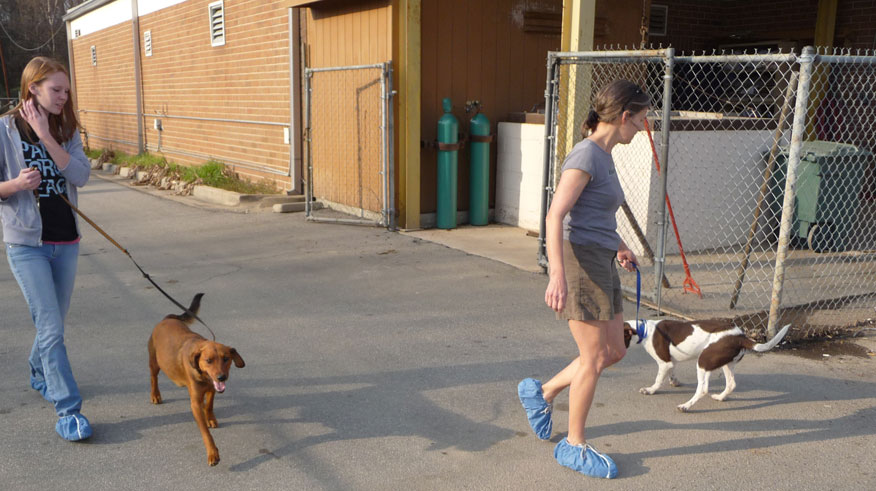
2009 Flyer: Cherry Blossom Festival or Cherry Blossom Blight?
Below is the front page of the flyer that was distributed March 19-28, 2009 in Macon. The cinderblocks, dog etching and cage chains of the Macon Animal Shelter gas chamber are in the background behind the cherry blossom.
To read Kathy's story about her visit to Macon, which appeared in abbreviated form on the back side of this flyer, click here.
|
||||
If you think it's mere chance you're following a truck that appears to be headed to the City Dump, think again:
The driver of that truck in front of us knew something we didn't know at the time: we were headed to the same place!
Odd combination of signs -- surely it's coincidental? Sadly, no. It's absolutely symbolic of the city's approach to the animals that passed through its hands in 2009:
Where is the Shelter? Now you understand our confusion in trying to find it. It's past the scales that trucks entering the City Dump must pass over! Dirt road, here we come:
A nice place to bring the kids on the weekend. Except they're not open on weekends:
|
|
|||
